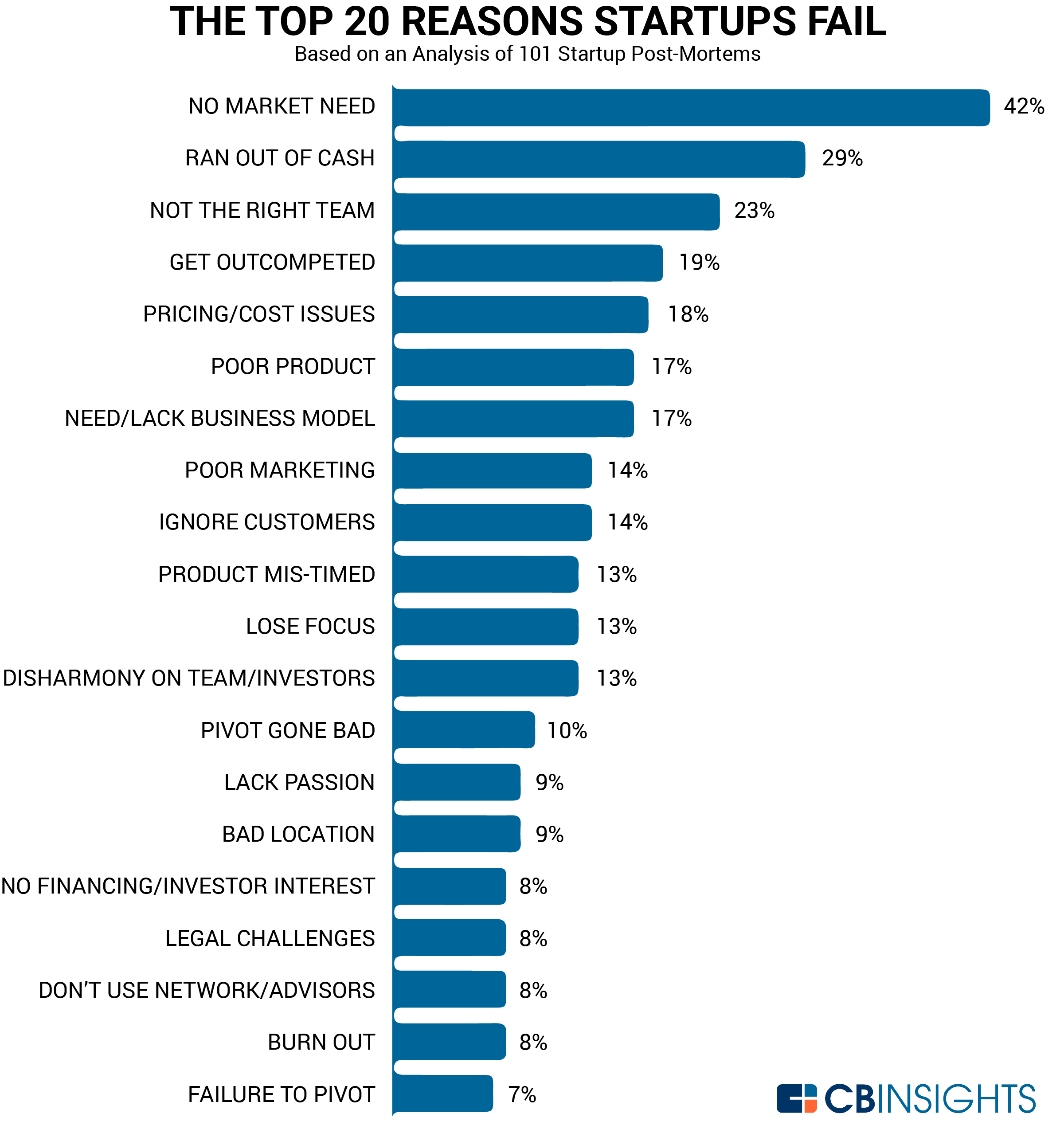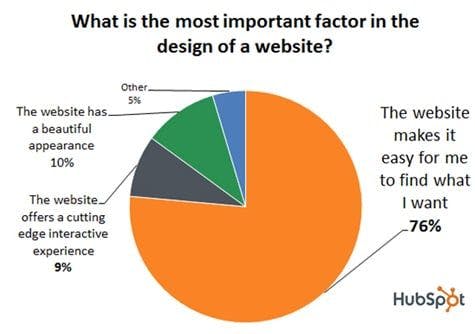Stating that an effective marketing strategy is essential for tech and non-tech startups is kind of preaching to the choir. Yet, back in 2018, CNBS insights shared a report revealing the most common reasons for startup failure. According to the report, in 14 percent of cases startup companies faded away due to poor marketing. For new marketers, this may be a good point to take into account and finally start dodging common startup marketing mistakes.

1. Chasing media fame too early
When launching a startup, get prepared to face a simple truth: not hitting top 10 in the niche you aim at is not a disease; media coverage cluttered with laudatory words is not a remedy.
People surely fall for the pompous smiling self-made entrepreneurs who share the stories of their devil-may-care practices to get their businesses to rocket to the skies. But they don’t see the behind-the-scenes of marketing processes and what it actually took to reach the highest bar. Now, it is quite au contraire, the entrepreneurs are eagerly sharing their downs along with the ups with a new motto: “Fuckup sucks, but instructs.”
Getting on a hype curve is not necessarily a bad strategy. It is important to show off your startup’s strong points in the best light possible. However, it may backfire in a big way if your startup is not ready for launch: the business idea is not tested and validated; the target audience is not defined. Media are craving for failure stories to the same extent they are for the stories of success.
2. Look too closely at the Competition
Spending too much time and efforts spying on competitors may not only distract you from focusing on your business but also it may get you in a dangerous game. You do need to keep an eye on your competitors and turn their weak points to your advantages, but make sure not to be carried away. Concentrate on your strong aspects and put unique strategies on the roadmap to leverage your sales.
3. Hiring in-house staff early on
When it comes to hiring people for a startup, it makes sense not to splash out money on the highly professional in-house marketing team. At the very beginning, it's sufficient to have a couple of professionals driven by the idea of giving your startup a boost. Later on, in about a year, as your business grows, you will need to build up a skeleton of the successful company — a team of dedicated employees sharing the same vision and mission.
For many startups, hiring staff comes down to available budget. A very limited budget makes founders turn to outsourcing the marketing tasks. However, stubbornly sticking to this option is very risky in terms of building the enthusiastic approach around company product’s development and growth; this is something you might want to consider at the first stages only.
You’re all set, you have a marketing team, but your marketing plan may never pull off if you’re, in the best sense of the word, a control freak that attempts to keep everything in order. At some point, you will simply burn out, and your employees will be trapped in the comfort zone. Remember: sharing is caring; delegating is motivating.
Another proven way to delegate is letting the influencers voice out their opinion on your startup. Let’s take a look at the winning case of the Swedish watches brand, Daniel Wellington. They paved their way to success through a huge number of small influences. As a result, it got transformed from a $15 000 startup into a $200 million business.
4. Brand Perfectionism
Another common marketing mistake is striving for perfection. To some extent, it reminds “The picture of Dorian Gray” scenario: while fresh backed marketers are preoccupied with external perfection, the core values they build a business model on are getting rotten. Making an ideal digital image brand that could perfectly resonate with your name in a business world takes too much time and money. You will be left with no funds to invest in your startup development. There is no doubt it will attract potential customers from the outset, but it won’t work in the long run.
Do not overdose your website with a sophisticated product description and excessive features, let your webpage breathe and it will eventually help customers discover what your business is all about and how it could solve their pains and needs. What really pays off when creating a brand is defining your target audience and listening closely to its suggestions and feedback. Ignoring the feedback is one of the huge marketing mistakes startups make.
5. Trying to appeal to everyone
Launching a startup without a clearly identified buyer persona reminds going on a hunt with a blindfold. You will be aiming at everything and eventually run out of bullets. This is what most startups fall for: trying to reach as many clients as possible without checking who could potentially be interested in the product or services.
For startups, identifying the target audience alone is not sufficient. You need to get insights into its behavior and preferences. For example, the statistics show that around 60% of US buyers are ready to disclose private information to get a more personalized shopping experience. Shoppers want their “prey” to come straight to their hands instead of hunting it.
When it comes to finding the ways and channels to accurately target the right audience, it is important not to confuse marketing and sales. Marketing makes people aware of your product and creates an environment for effective sales. Sales are aimed at closing the deal with a customer using persuasive techniques.
After you outlined the marketing and sales techniques, you need to establish your online presence by building a website. After all, for most customers looking for a trustworthy marketer, if you don’t have a website, you don’t exist as a business. The study shows that the customers form the first impression of the website in a matter of a few seconds. It is crucial to show your uniqueness, set a clear call-to-action message and create engaging content related to your product.
Yes, your startup won’t have its unique “voice” without a carefully planned content marketing strategy. Suffice it to say, with carefully planned SEO-powered content and, in particular, blogging techniques, you will drive more traffic to your website and help potential customers discover your newly launched product.
Creating a website is not a bottom line. That is why, from the early stages of launching the website and on, it needs constant maintenance: fresh content creation, SEO-optimization, bug fixing, payment gateway integration, etc.

Don’t try to be a jack of all trades and impress everyone. Let the professionals with a decent background in web development take care of the “website” part of your marketing plan. Choose your audience, be on the same page with your customer, speak the same language and it will have them make a decision in favor of your product.
6. Not creating and following a marketing plan
A marketing plan is needed for all the stages the businesses go through, but it is crucial for early phases when you need to squeeze maximum advantages out of a tight budget and to stay afloat in a chaotic startup environment. The marketing plan will help set the goals; identify potential customers and pains your product could help them cope with; give you a clear vision of what market you’re about to enter and who you’re going to compete with.
The marketing plan should be always aligned with your company vision, but it is not something that should be set in stone. The startups tend to ignore the fact that the audience is changing as new technologies and products are emerging. It requires revising marketing strategies on a regular basis.
Suffice it to say, marketing tools and techniques are being quite often updated. For instance, last year, Facebook imposed restrictions on the advertisers’ ability to target users. It was a challenge for entrepreneurs for whom Facebook was the main advertising channel. Google, another powerful marketing tool, keeps implementing new search algorithms which might push new marketers towards changing SEO strategies and modify the marketing plan accordingly.
When reviewing the marketing plan, startups are challenged with the necessity of coming up with fresh ideas and often aggressively borrow them. It’s not bad to copy something, but it’s important to be vigilant and not to cross the line. First, your startup can end up replicating ideas which cannot fit into the Procrustean bed of your business model. Also, cloning the marketing and product development strategies may result in legal proceedings.
In pursuit of outperforming the rival startups, emerging businesses often turned to shady marketing techniques: misleading ads, black-hat link building, excessive spamming or breaching the customers’ data. Sooner or later startup may not only end up with a stained reputation but being charged with heavy fines.
7. Relying on growth hacking
Neglecting a proper market and client discovery at the early stages, startups fail to achieve so-called “product market fit”. You can easily find out if your company reached this stage by asking one question: Will my clients be disappointed if my product disappear or they won’t notice it?
Founders don’t pay attention to the response they get from early adopters of the product and get laser-focused on the number of new customers rather than on the quality of the product. They tend to throw all resources on acquiring more clients through growth hacking techniques: aggressive investments in paid advertising, media coverage, and brand perfection.
Concentrating too much on making a hype through different marketing channels, they are not able to sustain a healthy business model which is doomed to failure from the very beginning. Let’s take an example of startup Juciero selling juicers. After receiving significant funds ($120m) from investors and major coverage from high-profile media platforms, it collapsed in just a couple of months and was named a “solution-to-nothing” startup.
Many companies viewed online paid advertising as Holy Grail of marketing. However, paid advertising alone is not an option for startups with a tight budget. It would be more reasonable to squeeze more juice out of organic advertising at lesser cost before branching out into paid advertising.
It is important to point out that for new marketers there is no room for excuses because where there’s a will, there’s a way; but finding the right path takes longer than one can expect. Growth hacking works and it is achievable, but only for the companies that reached their product market fit stage.
8. Spending money on marketing too quickly
With all that said, wasting too much startup money on marketing will not pull off in the long run, spending less than it is required is not an option either. Startups have to find a middle way which is achievable through the use of well-instrumented metrics. It helps startups anticipate what is likely to give the most bang for every buck they spend.
You need to understand the importance of experimenting and measuring everything you spend your money on and calculate the time and resources it took to recover the investments.
Conclusion
Dreaming big with a shoestring budget might be hard. When you launch a startup, you would probably want to start acting on impulse and could be torn by tempting opportunities. But, eventually, your startup may end up living a life of a rock star: live fast, die young.
The most important part about running a newly born startup is setting the right priorities. Don’t be diluted by the over-decorated stories of super successful companies and don’t try to copy their path to success. Find your unique branding voice and tunnel it through the right marketing channels. Figure out who may be interested in your product or services and don’t forget to harvest the feedback from your audience.
Finally, don’t choose spending money on perfection hunt over investing in product innovation. Take our pieces of advice as takeaway and avoid these marketing mistakes made by startups.





